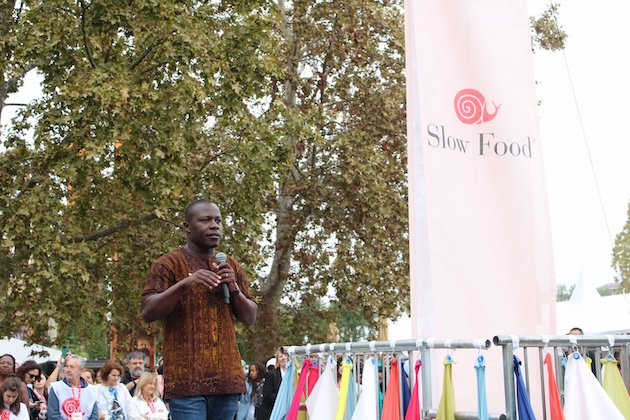TURIN, Italy, Oct 8 (IPS) – Edward Mukiibi, president of Slow Food, is championing agroecology as a transformative response to the world’s most pressing crises: food insecurity, climate change and violent conflict.
In a world where these challenges intersect, Mukiibi called for an urgent rethink of our approach to food systems.
Agroecologya practice already embraced by millions of farmers worldwide is emerging as a sustainable alternative to the industrialized agricultural model that dominates today. It emphasizes biodiversity, environmental stewardship and equitable living standards – elements that Mukiibi emphasizes are critical to tackling the multifaceted crises facing our planet.
Anticipating the long-awaited Terra Madre 2024 At the event in Turin, Mukiibi called for immediate global action to end the misuse of food as a weapon in war-torn areas such as Gaza and Ukraine, where food shortages exacerbate human suffering.
“Slow Food strongly advocates an end to all violence in the ongoing conflicts, from the Gaza Strip to Sudan, from Lebanon to the Democratic Republic of Congo, from Ukraine to Yemen, and opposes the use of food as a weapon of war,” the statement said. spokesman. Mukiibi, calling for immediate negotiations to reach a just solution that safeguards the dignity of all people and promotes a peaceful future for all.
As global crises become more complex, Mukiibi emphasizes that agroecology is not just about agricultural techniques – it is a framework for building more resilient societies.
The power of agroecology
As climate change accelerates, its devastating consequences – melting glaciers, rising sea levels, extreme weather events and changing ecosystems – are becoming increasingly difficult to ignore. Mukiibi linked these environmental crises directly to our food systems, calling industrial agriculture a “main culprit.” He argues that agroecology offers a path to resilience, citing its ability to restore soil health, reduce social inequality and provide economic opportunity for local communities.
Mukiibi’s call for change comes as 3,000 international delegates gather at the biennial Terra Madre event to explore solutions for sustainable food systems. He argues that agroecology not only restores soil fertility and promotes environmental health, but also strengthens local economies, reduces social inequalities and builds resilience to climate-induced disasters.
“As climate change intensifies, agroecology offers a path to more resilient and equitable food systems,” said Mukiibi. “This situation forces us to think about the transformation needed if we are to achieve a food system that feeds all people well, regenerates and protects the environment, and enables local cultures to survive and thrive.”
A call for a reset of the global food system
Carlo Petrini, the founder of Slow foodechoed Mukiibi’s sentiments and called for nothing less than a complete reset of the global food system.
“The current global food system is not only unfair, but criminal because it destroys our mother earth, destroys biodiversity, is based on waste and has turned food into a price, not a value,” Petrini said. “We must restore the value of food, because food represents our common good; with food we can create relationships with each other, we can create reciprocity.”
Petrini emphasized the political significance of food in shaping our future, arguing that the fight for sustainable food systems is inherently linked to larger social and environmental battles.
Petrini also condemned multinational corporations that put profit above the health of the planet, calling on them to stop polluting ecosystems through unsustainable food production methods. He called for an ecological transition.
Food and humanity
Pope Francis, head of the Catholic Church, also weighed in, emphasizing the spiritual and cultural dimensions of food.
In a message to the Terra Madre network, the Pope criticized the commercialization of agriculture, noting that it is manipulated for profit, at the expense of both the environment and human dignity.
The Pope praised Terra Madre for promoting a movement that respects the integrity of both food and culture. He argued that only by recognizing the value of food and promoting food education can humanity move toward a future of universal brotherhood – a future in which diversity is celebrated rather than a cause of division.
The food revolution
Terra Madre was launched twenty years ago and has sparked a global food revolution. Over the past twenty years, it has united small-scale producers, farmers and consumers committed to creating a better, cleaner and fairer food system.
Mukiibi said Terra Madre 2024 serves as a reflection point, a moment to assess progress made and chart a course for the future.
Coinciding with Terra Madre, G7 Agriculture Ministers met in Sicily, where Slow Food has urged governments to do so place food are central to global political agendas. The call is clear: food must be recognized as a cornerstone of fundamental rights and environmental sustainability.
Mukiibi underlined that millions of farmers around the world are already practicing agroecology, ensuring food sovereignty, food security and healthy nutrition. He emphasized the need to build on these successes by expanding the Slow Food Network and enabling more farmers to adopt agroecological practices.
Agroecology is a way forward for resilient local food systems, Mukiibi noted, explaining that Slow Food was building a network of Slow Food Farms to empower farmers and put them at the heart of future sustainable food systems.
A hopeful vision of the future
Mukiibi’s message is that agroecology is not just an agricultural method, but a movement with the potential to address some of the most profound challenges of our time.
“Agroecology is the solution not only for a more sustainable food system, but also for tackling inequality, social injustice and the global environmental crisis.”
As the world grapples with the devastating impacts of climate change, violent conflict and food insecurity, Slow Food’s vision offers a hopeful path forward – one in which food is not a weapon, but a source of unity, resilience and renewal. .
IPS UN agency report
Follow @IPSNewsUNBureau
Follow IPS News UN Bureau on Instagram
© Inter Press Service (2024) — All rights reservedOriginal source: Inter Press Service

